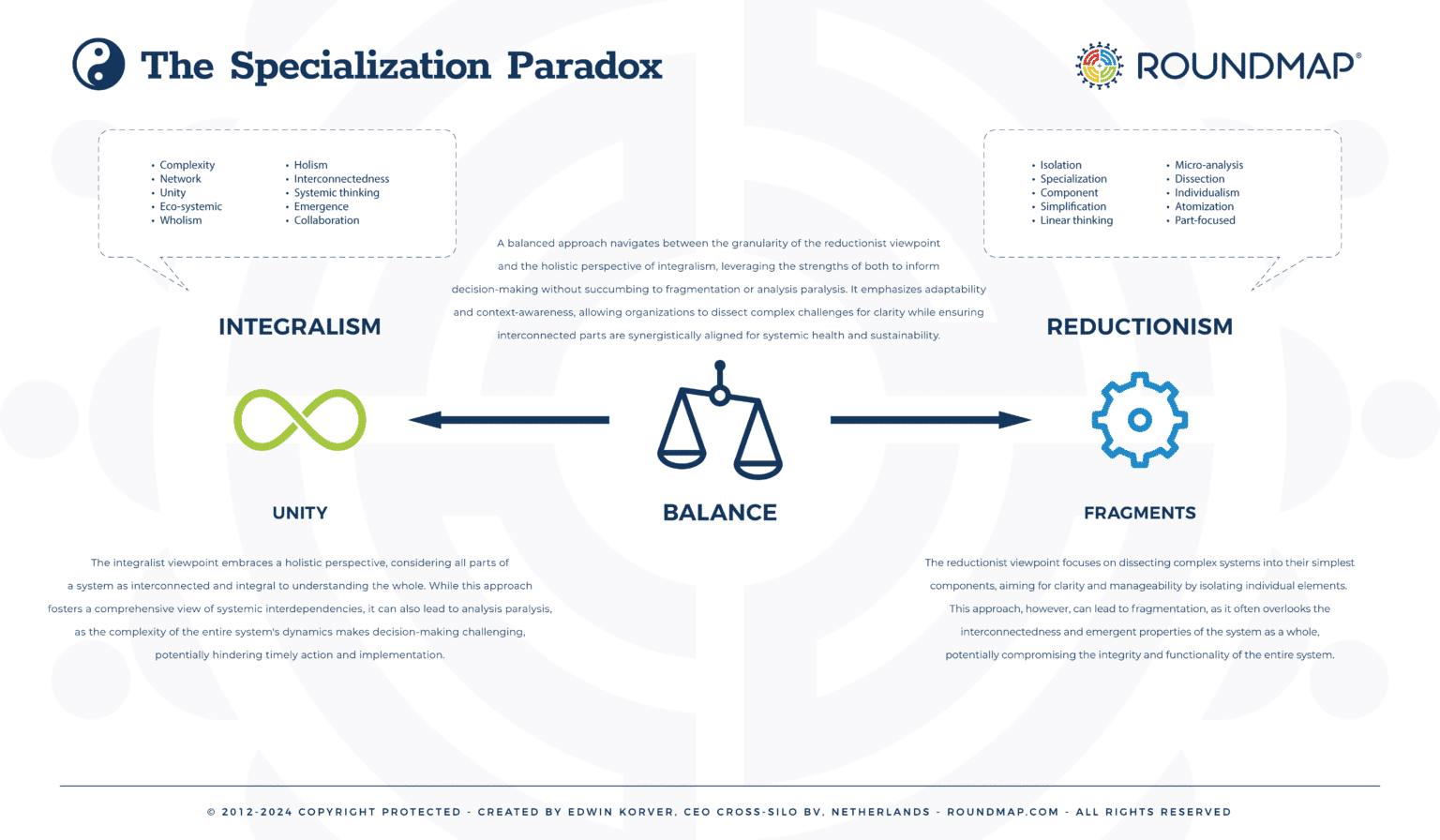In an era of increasing business complexity, balancing deep specialization with broad generalization becomes more critical. This tension forms the core of the ‘Specialization Paradox,’ urging a reevaluation of optimizing parts without compromising the whole.
While offering clarity in decomposing complex systems, the reductionist approach often misses the forest for the trees, neglecting how interconnected parts affect overall system health. This perspective, prevalent in everything from hiring to decision-making, suggests that fixing parts leads to system-wide improvements—a notion that overlooks complex systems’ emergent behaviors and interdependencies.
The pressing question becomes: How can organizations balance specialized expertise and a holistic operational view to ensure part optimization enhances rather than undermines system vitality?
Addressing the Specialization Paradox requires a nuanced blend of reductionist and integralist approaches, encouraging comprehensive strategies that are analytically sound and socially responsible. In moving forward, the fusion of specialization precision with holistic insight is critical to unlocking strategies that foster operational success and long-term, sustainable health and integrity of the entire system.
Understanding the Specialization Paradox
The Specialization Paradox arises from the need to balance two seemingly opposed approaches to understanding and solving problems within complex systems. On one side is reductionism, the analytical approach that breaks down complex systems into their simplest parts to understand the whole. On the other side stands integralism, which views systems holistically, recognizing that the sum of interconnected parts creates emergent properties that cannot be understood in isolation.
The Consequences for Business Strategy
Businesses often lean towards a reductionist approach for its clarity and simplicity in solving problems. However, this can lead to strategies that fail to account for the system’s dynamic interdependencies, leading to unforeseen consequences. Conversely, an overly integralist approach might capture the system’s complexity but at the expense of actionable insights, resulting in paralysis by analysis.
The paradox demands a balance: leveraging the precision of reductionism to dissect problems while embracing the holistic insights of integralism to innovate and adapt sustainably.
Navigating the Specialization Paradox
Navigating the Specialization Paradox requires organizations to balance detailed, analytical thinking with a broad, systemic view. This approach is crucial for businesses seeking to thrive in complex environments. Let’s explore how to implement each strategy effectively:
1. Embrace a Dual Lens Approach
To encourage teams to alternate between reductionist and integralist perspectives, organizations can:
- Introduce Training Programs: Develop workshops and training sessions highlighting the value of both perspectives. Use real-world case studies to demonstrate how each approach can lead to different insights and solutions.
- Promote Perspective-Shifting Exercises: Regularly engage teams in exercises that require them to switch between focusing on the minutiae of their projects and considering their work’s broader impacts. This could involve role-playing activities, scenario planning, or cross-functional team meetings.
2. Foster Cross-disciplinary Collaboration
To integrate diverse perspectives effectively:
- Create Mixed-Function Teams: Assemble teams with members from different disciplines for specific projects. This structure encourages the sharing of varied insights and fosters innovative problem-solving approaches.
- Establish Collaboration Platforms: Utilize digital tools and platforms that facilitate communication and knowledge sharing across departments. Encourage using these platforms for project management, brainstorming, and documenting collaborative processes.
3. Implement Adaptive Strategic Frameworks
Adaptive frameworks are crucial to maintaining flexibility in strategy formulation:
- Adopt Agile Methodologies: Agile methodologies make teams more responsive to changes. Implement agile practices in software development and across strategic planning processes to enhance adaptability.
- Utilize Scenario Planning: Engage in scenario planning exercises exploring various possibilities. This approach helps organizations prepare for different outcomes and adapt their strategies as circumstances evolve.
4. Cultivate Continuous Learning
Building a culture that values learning is essential for both specialization and systemic understanding:
- Encourage Professional Development: Provide resources and support for employees to pursue further education, certifications, and training in both their field of expertise and in areas outside their immediate responsibilities.
- Implement Knowledge Sharing Sessions: Regularly schedule sessions where employees can share insights from recent learning experiences, projects, or research. This spreads knowledge and encourages a culture of curiosity and continuous improvement.
Integrating These Strategies
Integrating these strategies into an organizational culture aligns closely with your brand’s vision of fostering collaboration, continuous innovation, and whole-system thinking. By implementing these practices, organizations can better navigate the complexities of modern business environments, ensuring they are both analytically robust and adaptively aware. This holistic approach leads to more sustainable business practices and aligns with fostering collective success and differentiation through innovation and adaptability.
The RoundMap® Approach
At RoundMap®, we believe navigating the Specialization Paradox effectively is the key to unlocking sustainable business success. Our framework is designed to help organizations balance the reductionist and integralist approaches, fostering a culture of continuous innovation and adaptability.
Through tools, workshops, and consultancy, we guide businesses in implementing analytically sound and holistically informed strategies, ensuring they are well-equipped to thrive in today’s complex environment.
Conclusion
The Specialization Paradox challenges us to rethink our approach to business strategy in the face of complexity. By balancing reductionism and integralism, we can develop both detailed and holistic strategies, analytical and adaptive strategies, ensuring that our organizations are resilient and capable of sustained innovation in an ever-changing world.
Author
-
Edwin Korver is a polymath celebrated for his mastery of systems thinking and integral philosophy, particularly in intricate business transformations. His company, CROSS-SILO, embodies his unwavering belief in the interdependence of stakeholders and the pivotal role of value creation in fostering growth, complemented by the power of storytelling to convey that value. Edwin pioneered the RoundMap®, an all-encompassing business framework. He envisions a future where business harmonizes profit with compassion, common sense, and EQuitability, a vision he explores further in his forthcoming book, "Leading from the Whole."


